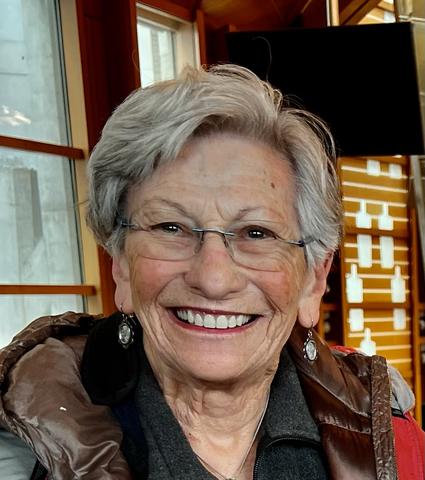Schur Kaufman lifts students who need paying internships.
Susan Schur Kaufman didn’t attend the Hubbard School, yet she created the Susan Schur Kaufman Fund to give Hubbard School students seeking internships with a focus on ethical and objective political reporting in a state or federal government or nonprofit public service organization the funds they need to pursue them.
She said she became “quite attached to the U” because of her husband, Clayton Kaufman (B.A. ’48), who was a Minnesota Daily reporter and full of school spirit. “He was very devoted to the School,” she said. Kaufman went on to report for the UPI and spent much of his career at WCCO, including as general manager. “He was a stickler for precision, accuracy in reporting, and continued to write letters to the editor” after retirement, Schur Kaufman said, laughing.
His passion became an honored, lasting legacy: In 1994, he received the Distinguished Alumni award from the College of Liberal Arts and in 2007, he was inducted into the Minnesota Broadcasters Hall of Fame. His love of the U was contagious: Schur Kaufman said when they married later in life her “contacts, relationships, support, and activity all became associated with the U.”
But she comes at journalism from an equally storied, if different, perspective. As a young idealist with her political science degree in hand, she went to work in public service in Washington, D.C. for the Kennedy administration, surrounded by other idealists.
Then, though she said it was “the last thing she thought she’d do with her life,” she entered politics in 1973, and was eventually elected as a Massachusetts state representative in 1980, where she served for 14 years. “My career there was highlighted—or low-lighted—by the rise of talk radio, the beginning of cable and internet, and the fading of facts and truth and unbiased reporting,” she said. “I’ve kept my idealism, but even back then was disheartened by the direction that information was going out. And that obviously stuck with me through my career and some pretty nasty battles over those years—even more so as we got into the current era; the rise of unfiltered, distorted, biased information has continued to distress me a great deal. It’s not that I’ve become cynical. I’ve become distressed.”
She was also very aware of how some reporters portrayed her quotes or coverage as a legislator, and she sees echoes of this biased coverage today—she said her “favorite quote” came from one talk-radio host who said she was “a cockroach who crawled around in the dark of night, stealing people’s money.” She also saw biases in how reporters covered a female legislator versus a male one—her quotes would often be attributed with more charged words, such as “argued” instead of “said,” “advocated,” or “contended,” for example. She had her fair share of misquotes.
It gave her a critical lens through which to think about the importance of the education surrounding the privilege of the freedom of the press, and she kept her eye trained on how the media environment has intensified in recent years. “Because my whole life was dedicated to public service in one form or another, most of my reading was nonfiction and I was always on top of the news,” she said. “I had an addiction following everything that was going on.”
That continues today, though she gets most of her news through print and some limited television. She said she’s also distressed about how much further some media outlets have swung, and how students may switch to marketing majors when there’s so clearly a need for ethical, factual, unbiased reporting.
“I wanted [the scholarship] to stay focused on journalism in whatever form, whether electronic media, print, TV, or radio. That I continue appealing to the idealistic side of students today. And I know they are. This generation is showing it has some very definite concerns about the direction we’re going in,” she said.
She wants to help return print journalism to its ideals in a time when “truthiness” has become accepted on some channels as a tenet more than a funny buzzword. “With every passing day I feel still very strongly about the need to have the kind of journalism it used to be,” she said. “You should be able to get informed and think critically about it as opposed to being brainwashed and/or fed conspiracy theories. Ethical, unbiased journalism is essential to living a decent life.”
By Katie Dohman
